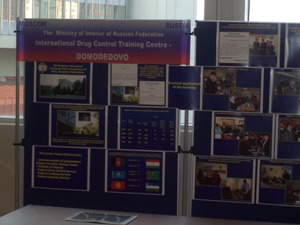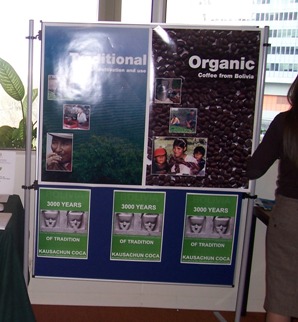As the UN's Commission on Narcotic Drugs met this week in Vienna, it and its brother UN anti-drug agencies came under fierce attack for sacrificing human rights on the altar of the drug war.
Efforts to legalize medical marijuana via the legislative process are underway in several states. We take a look at where those efforts stand and where they're likely headed.
We are pleased to offer the works "Over the Influence: The Harm Reduction Guide for Managing Drugs and Alcohol," "Women Behind Bars: The Crisis of Women in the US Prison System," and "Cannabis: Yields and Dosage," as our latest membership premium gifts.
A crooked Boston cop is headed for prison, a sticky-fingered Indianapolis cop now faces charges, and the trial of two Maryland prisoners accused of killing a guard is opening a window into corruption in the now shuttered House of Corrections.
The Second Chance Act passed the Senate Tuesday night. It passed the House last year, and President Bush is expected to sign it into law shortly. It will provide $360 million for prisoner re-entry services in a bid to reduce recidivism.
A bill that would expand eligibility for diversion to drug court has passed the New Jersey legislature. Gov. Jon Corzine (D) is expected to sign it shortly.
UNODC head Antonio Maria Costa let slip some intemperate remarks during the UN drug meeting in Vienna this week.
The Bolivian government has responded to the International Narcotics Control Board's demand last week that coca chewing and growing be banned by publicizing plans to enlarge markets for coca products.
The conservative Dutch government will review the country's 30-year experiment with pragmatic tolerance of marijuana use and sales, and the Justice Minister has announced he wants to ban "grow shops."
The Vatican has issued a modern version of the "seven deadly sins," and selling and using drugs made the list.
Events and quotes of note from this week's drug policy events of years past.
Apply for an internship at DRCNet for this fall (or spring), and you could spend the semester fighting the good fight!
Do you read Drug War Chronicle? If so, we need your feedback to evaluate our work and make the case for Drug War Chronicle to funders. We need donations too.
Support the cause by featuring automatically-updating Drug War Chronicle and other DRCNet content links on your web site!
A new way for you to receive DRCNet articles -- Drug War Chronicle and more -- is now available.
Visit our new web site each day to see a running countdown to the events coming up the soonest, and more.
Using the annual meeting of the United Nation's Commission on Narcotic Drugs (CND) in Vienna as a springboard, an international consortium of drug policy, harm reduction, and human rights groups Monday slammed the UN drug bureaucracies for ignoring numerous, widespread human rights abuses perpetrated in the name of global drug prohibition. The UN must stand up for human rights in the drug control regime, the groups said.

Iranian CND display
The charge was made in a report released the same day,
"
Recalibrating the Regime: The Need for a Human Rights-Based Approach to International Drug Policy," endorsed jointly by Human Rights Watch, the International Harm Reduction Association, the Canadian HIV/AIDS Legal Network, and the Beckley Foundation Drug Policy Program. It was presented this week in Vienna during a discussion of the worldwide human rights impact of the drug war conducted as part of a series of events countering the official CND meeting.
The CND, the International Narcotics Control Board (INCB), and the UN Office on Drugs and Crime (UNODC), are the three UN entities charged with enforcing global drug prohibition as enshrined in the 1961 Single Convention on Narcotic Drugs and its two successor treaties. The CND was meeting this week to review whether the UN had met its 1998 10-year goal to achieve "measurable results" in the fight against drugs, including a "significant reduction" in the cultivation of cannabis, coca, and opium.
The Monday report cites murderous campaigns against drug suspects in Thailand in 2003 -- and the prospect of a repeat of that deadly drug war by the new Thai government -- the violent police campaign against drug dealers (and innocent bystanders) in Brazil, the grotesque Chinese habit of celebrating the UN's international anti-drug day by executing convicted drug offenders, the resort to the death penalty for drug offenders in more than 60 countries, the mass incarceration of drug offenders and the racially discriminatory enforcement of drug laws in places like the United States, and much, much, more as evidence that human rights comes in a distant second to the prerogatives of drug prohibition.

Thai officials attend human rights panel slamming Thai government
In the face of this litany of human rights abuses in the name of enforcing drug prohibition, the UN agencies have remained so quiet as to be almost "complicit" in them, the report argues. There has been "little engagement" with this issue by the CND, the INCB, the UNODC -- or even the UN's human rights treaties bodies, the report said.
.
"The UN General Assembly has stated repeatedly in resolutions that drug control must be carried out in full conformity with, and full respect for, all human rights and fundamental freedoms," said Mike Trace of the Beckley Foundation, which commissioned the report. "Delegations to this week's meeting must ensure that their obligations under international human rights law underpin all CND deliberations and actions."
"Despite the primacy of human rights obligations under the UN Charter, the approach of the UN system and the wider international community to addressing the tensions between drug control and human rights remains ambiguous," said Richard Elliott of the Canadian HIV/AIDS Legal Network. "This is inexcusable in the face of the egregious human rights abuses perpetrated in the course of enforcing drug prohibition, which in turn damages global efforts to prevent and treat HIV."
"Last week, INCB President Philip Emafo stated in the board's 2008 annual report that 'To do nothing [about drugs] is not an option'," said Rick Lines of the International Harm Reduction Association. "We are here today to state clearly that doing nothing about the human rights abuses perpetrated in the name of the drug war is also not an option. In this, the 60th anniversary year of the Universal Declaration of Human Rights, CND member states and indeed the entire UN family must speak out clearly that human rights must not be sacrificed on the altar of drug control."

Russian CND display
The new Thai government's repeated comments that it intends to go back to former Prime Minister Thaksin Shinawatra's murderous drug war of 2003, in which some 2,800 were killed, aroused particular concern among the groups.
"As the UNODC has acknowledged, there are proven methods to address drug use while protecting human rights. Murder is not one of them," said Rebecca Schleifer, advocate with the HIV/AIDS and Human Rights Program at Human Rights Watch. "As a member of the CND, Thailand must be held to account for its actions on drugs, and pressure brought by the international community to ensure that human rights violations are not repeated."
The Thai may be feeling the pressure. At the Monday afternoon "side session" organized by the groups, not one but three officials from the Thai government attended, all of them expressing the view that policies have "good effects and bad," and inviting advocates to provide information to help them improve policies. Time will tell whether it was a serious offer and whether they can influence their government in a positive direction if so.
Monday's report was only part of a broader onslaught directed at the UN anti-drug bureaucracies and their seeming disdain for human rights. Last week, in the wake of the release of the INCB's 2007 Annual Report, which called for "proportionality" in the enforcement of drug laws at the same time it called for criminalizing millions of people who chew coca leaf, that organization was critiqued in a response by the International Drug Policy Consortium, a global network of national and international groups specializing in issues relating to drug use, legal or illegal.
While the consortium congratulated the INCB for its call for proportionality and a slight retreat in its resistance to harm reduction, it warned that such good news "will be rendered meaningless if the Board does not consistently reflect these principles in its ongoing work with national governments and other UN agencies."
The consortium also harshly criticized the INCB for its call for the banning of the growing and consumption of coca. "Of greater concern is the continuing intransigence shown towards the issue of indigenous use of coca products in Bolivia," the consortium's response said. "Where there is an unresolved inconsistency within the drug control conventions, and between drug control and other international obligations and treaties, the role of the INCB should be to highlight these dilemmas and help governments to find a resolution, instead of issuing rigid and non-universal declarations."
The British drug charity DrugScope, a member of the consortium, called on the INCB to do more. "Drug users are vilified and marginalized worldwide," said Harry Shapiro, the group's director of communications. "Some nations feel that any action against them is justified, including murder. We are encouraged that the INCB recognizes this is unacceptable and that a balance must be struck between the enforcement of drug laws and the human rights and civil liberties of those with serious problems."
The INCB must match its actions to its words, Shapiro said. "But DrugScope and the International Drug Policy Consortium feel that the INCB, from their position of international authority, must follow their condemnation of human rights abuses through to its logical conclusion, The INCB must offer public criticism of particular countries with the worst human rights record in this area."
Instead of UN anti-drug agencies sticking up for human rights, they have now become the objects of criticism themselves. The official international prohibitionist drug policy consensus may be holding at the UN, but it is clearly fraying, and civil society is no longer willing to sit quietly in the face of injustice, whether in Bangkok or Baltimore, Rio or Russia.
(Look for in-person reports on the UN summit next week.)
back to top
A dozen years after California voters ushered in the age of legal medical marijuana by supporting Proposition 215, the legal use of the herb for medicinal purposes has spread to 11 other states -- Alaska, Colorado, Hawaii, Maine, Montana, Nevada, New Mexico, Oregon, Rhode Island, Vermont and Washington -- but in recent years, progress has been excruciatingly slow.

2005 Coalition for Medical Marijuana-NJ press conference
The last statewide initiative to go to voters failed in 2006 in South Dakota -- the only state where voters have rejected an initiative legalizing medical marijuana -- and last year, it took Herculean efforts by New Mexico Gov. Bill Richardson (D) to revive and rescue the medical marijuana bill there, making the Land of Enchantment the only state to be added to the list of medical marijuana states in 2007. (Rhode Island legislators, who had passed a sunsetted bill in 2006, made it permanent last year.)
This year, serious efforts to pass medical marijuana laws at the state house are underway in several more states, with most of the efforts being run by local groups backed by either the Marijuana Policy Project (MPP) or the Drug Policy Alliance (DPA). Here's a look at the states where there has been or will be action at the state house on medical marijuana:
Alabama: A medical marijuana bill was introduced last week by Rep. Laura Hall (D), but has yet to be assigned a bill number. This will mark the second year in a row that Alabama legislators have had a medical marijuana bill before them. There will be hearings this year, said Loretta Nall, executive director of Alabamians for Compassionate Care, the local group coordinating the effort to pass the bill.
One of those who will testify is Jacki Phillips, whose son, Michael Phillips, had testified in support of medical marijuana in the past. Michael Phillips, who throughout his life suffered from seizures related to brain tumors, died last December in a New Orleans hotel room during the DPA conference.
"I'm going to tell those lawmakers that the system killed my son," said Phillips. "I truly believe that if he could have gotten the marijuana and it had been regulated like other seizure medicines, he would be alive today. I'm not asking them to legalize it for potheads," she said, "I'm a Southern Baptist and I believe God gave you a brain to use, but using marijuana for medical purposes would help a lot of people."
Marijuana didn't stop Michael Phillips' seizures, his mother said, "but it gave him the chance to function on a normal level for a period of time." When he smoked marijuana, she said, he would still have seizures, but their frequency and intensity was greatly reduced.
Connecticut: After seeing a medical marijuana bill pass the legislature there last year only to be vetoed by Gov. Jodi Rell (R), activists there have found little traction on the issue this year as the legislature debates other criminal justice and drug policy issues.
"We were emboldened last year and then deeply disappointed that people still essentially have to commit a crime to get access to medicine," DPA policy director Gabriel Sayegh told the Hartford Business Journal earlier this month. But despite little progress this year, "there is no doubt we are going to continue with this," he vowed.
Illinois: A medical marijuana bill, SB 2865, has passed committee votes and is now headed to the Senate floor, but its House companion bill, HB 5938, lost a committee vote this week. Still, that doesn't mean the measure is dead.
"Unlike many states, losing a committee vote doesn't kill your bill," said MPP's Mirken, who spent part of this week at the state capitol in Springfield accompanying patients as they lobbied legislators.
MPP and local reform groups IDEAL (Illinois Drug Education and Legislative Reform) and Illinois Compassion Action Network are keeping the pressure on. This week, MPP released a poll showing 68% support for medical marijuana in the state.
Kansas: The first effort at passing a medical marijuana bill in Kansas, supported by the Kansas Compassionate Care Coalition and former Republican Attorney General Robert Stephan, ended a couple of weeks ago, bottled up in committee by a hostile committee chair. While disappointing, that is hardly surprising, given the torturous legislative process facing any new bill.
Kansans should not be disheartened that they did not achieve victory in their first try, said MPP's Mirken. "It has been a multi-year struggle in all the states that have passed these laws," he said. "It's no surprise that it will take more than one year in Kansas."
Minnesota: Last year, a medical marijuana bill passed the state Senate, but died of inaction in the House in the face of veto threats from Republican Gov. Tim Pawlenty. But MPP and local affiliate Minnesotans for Compassionate Care are again working with friendly legislators. A Republican House member, Rep. Chris DeLaForest, is cosponsoring a House bill this year.
Minnesota's is a two-year legislative session, so that means only a House bill must pass this year, provided it is congruent with the already passed Senate bill.
"We are sitting in the House waiting for it to be brought up," said Mirken. "We're hoping it will pass and the governor will see the light."
New Jersey: For the fourth consecutive year, a medical marijuana bill, AB 804 has been introduced by Assemblyman Reed Gusciora (D-Mercer) and a companion bill has been introduced in the state Senate. DPA's New Jersey office is working the legislature, but there seems little likelihood the Senate will act.
"The Senate has always been the hold-up," said Ken Wolski, RN, executive officer of the Coalition for Medical Marijuana-New Jersey. "Although Gov. Corzine has said he would sign a bill if it gets to his desk, the Assembly doesn't really want to mess with it if the Senate won't move on it, so here we are."
New York: A medical marijuana bill, SO4768, initially introduced last year was reintroduced in January. It passed the Assembly last year, but was referred at that time to the Senate Health Committee where it has languished ever since. Given the turmoil in Albany in the wake of this week's resignation of Democratic Gov. Eliot Spitzer, said MPP's Mirken, it will take awhile for the dust to settle. "We're trying to figure out how the Spitzer follies will change the situation, " he said. "While we have some hopes for New York, at this point, medical marijuana is not on the top of anybody's agenda."
One optimistic sign, said Mirken, was that the new governor, David Paterson, is on much better terms with Republican Senate majority leader Joseph Bruno. Another is that, like Minnesota, New York has a two-year session, so a bill will not have to again pass the Assembly.
The medical marijuana movement has mowed its way through most of the low-hanging fruit of the initiative states and now faces the long, hard slog through the legislative process if it wants to get more states on board. While it is less expensive to attempt to win in the legislature than at the ballot box, it is also much more difficult and complicated.
"A lot of politicians are needlessly skittish about the politics of this," said Mirken. "If it were just a vote on the merits, it would pass today. Everywhere, we can produce polling numbers to show these guys a medical marijuana vote is not going to hurt them, but there is a deeply ingrained fear of being portrayed as soft on drugs, and that's very difficult to overcome. It's a real struggle," he said.
When pressed on where victories might come this year, Mirken was careful. "I'd say there was a fighting chance in Illinois, Minnesota, and New York, but in an election year, politicians are more timid than usual," he offered.
The real best shot this year, he said, is likely Michigan, where an initiative has been approved for the November ballot.
back to top
 We are pleased to announce our first membership premiums of 2008, three very different and important books:
We are pleased to announce our first membership premiums of 2008, three very different and important books:
 Women Behind Bars: The Crisis of Women in the US Prison System. This work by Silja Talvi, one of the most active writers on criminal justice issues, draws on interviews with inmates, correctional officers and administrators, providing readers with a look at the devastating impact incarceration is having on our society.
Women Behind Bars: The Crisis of Women in the US Prison System. This work by Silja Talvi, one of the most active writers on criminal justice issues, draws on interviews with inmates, correctional officers and administrators, providing readers with a look at the devastating impact incarceration is having on our society.
 Over the Influence: The Harm Reduction Guide for Managing Drugs and Alcohol. Dr. Patt Denning offers a much needed guide to options for dealing with substance use issues that go beyond the conventional "all or nothing" approaches.
Over the Influence: The Harm Reduction Guide for Managing Drugs and Alcohol. Dr. Patt Denning offers a much needed guide to options for dealing with substance use issues that go beyond the conventional "all or nothing" approaches.
Cannabis Yields and Dosage, by court-certified cannabis expert Chris Conrad, is the authoritative study of the science and legalities of calculating medical marijuana.
 Copies of Women Behind Bars or Over the Influence can be requested with donations of $30 or more -- donate $55 or more to receive both. Copies of Cannabis Yields and Dosage can be requested with donations of $20 or more -- donate $45 or more for Cannabis Yields and Dosages plus one of the others. Donate $70 and receive all three books as our thanks. We also continue all our other recent offers -- visit our donation page online to view all the offerings in the righthand column.
Copies of Women Behind Bars or Over the Influence can be requested with donations of $30 or more -- donate $55 or more to receive both. Copies of Cannabis Yields and Dosage can be requested with donations of $20 or more -- donate $45 or more for Cannabis Yields and Dosages plus one of the others. Donate $70 and receive all three books as our thanks. We also continue all our other recent offers -- visit our donation page online to view all the offerings in the righthand column.
 You can also preview Cannabis Yields and Dosage online at ChrisConrad.com -- the print copies we'll send you are thanks for your generous donations, and I hope you will donate. Your donations will help DRCNet as we advance our campaign to stop dangerous SWAT raids in routine situations; to take on new issues like the drug penalties in welfare and housing law; to advance the dialogue on drug legalization; to continue our stunning web site successes of the last third of 2007; while continuing to publish our acclaimed and widely-used newsletter, Drug War Chronicle.
You can also preview Cannabis Yields and Dosage online at ChrisConrad.com -- the print copies we'll send you are thanks for your generous donations, and I hope you will donate. Your donations will help DRCNet as we advance our campaign to stop dangerous SWAT raids in routine situations; to take on new issues like the drug penalties in welfare and housing law; to advance the dialogue on drug legalization; to continue our stunning web site successes of the last third of 2007; while continuing to publish our acclaimed and widely-used newsletter, Drug War Chronicle.
So please make a generous donation today to help the cause! I know you will feel the money was well spent after you see what DRCNet has in store. Our online donation form lets you donate by credit card, by PayPal, or to print out a form to send with your check or money order by mail.
Please note that contributions to the Drug Reform Coordination Network, our lobbying entity, are not tax-deductible. Tax-deductible donations can be made to DRCNet Foundation, our educational wing. (Choosing one or more gifts will reduce the portion of your donation that you can deduct by the retail cost of the item.) Both groups receive member mail at: DRCNet, P.O. Box 18402, Washington, DC 20036.
Thank you for your support.
back to top
A crooked Boston cop is headed for prison, a sticky-fingered Indianapolis cop now faces charges, and the trial of two Maryland prisoners accused of killing a guard is opening a window into corruption in the now shuttered House of Corrections. Let's get to it:
In Boston, a former Boston police officer was sentenced Monday to 18 years in federal prison for protecting cocaine shipments for FBI agents posing as drug dealers. Former Officer Nelson Carrasquillo was one of three Boston officers nailed in the sting; one other was sentenced to 13 years, while the other has yet to be sentenced. They were arrested in 2006 after traveling to Miami to collect $36,000 in payment from the supposed dealers. Carrasquillo provided counter-surveillance services, monitored Boston police radio, and guided a drug dealer in his travels, prosecutors said.
In Indianapolis, an Indianapolis police officer was arrested Monday for stealing a $725 money order during the search of a drug suspect's home and cashing it for himself last year. Officer Jason Edwards, 36, is charged with forgery and theft. Edwards was one of a group of narcotics officers who raided the home last December. The suspect later reported that the money order, with which he intended to pay his rent, was missing. His bank told him the money order had been cashed, with Jason Edwards in the "pay to the order of" line, and a Jason Edwards signature on the back. The suspect then contacted police, and Edwards subsequently admitted to taking the money order, although he claimed he found it on the ground outside the home. The eight-year veteran is now suspended without pay.
In Baltimore, 21 prison guards at the Maryland House of Corrections were implicated in contraband smuggling and other corrupt activities, according to state police reports given to defense attorneys for two inmates accused of killing a guard at the now shuttered prison. That guard, David McGuinn, was one of two killed at the prison during 2006, which led Gov. Martin O'Malley to shut it down shortly after he took office. Defense attorneys for the inmates are using the state police reports to allege that corrupt guards involved in smuggling "ordered the hit" on McGuinn, that they moved critical evidence -- the shank used to stab him -- and that they beat up an inmate and planted the shank on him to cover-up a beating they inflicted on him the day of McGuinn's death. Look for more to be revealed as this case moves forward.
back to top
Three years after it was first introduced, the Senate Tuesday evening passed the Second Chance Act, a measure aimed at reducing prison populations and corrections costs by reducing the recidivism rate among people released from prison. The bill would provide federal funding to develop programs dealing with job training, substance abuse, family stability, and for employers who hire former prisoners.

overcrowded prison dorm, California
Nearly 700,000 people a year are released from state and federal prisons, according to Justice Department statistics. If drug offenders, who make up about one-quarter of the prison population, are released in roughly the same proportion, that means about 175,000 drug offenders will benefit from the program each year.
Currently, an estimated two-thirds of released prisoners will find themselves in trouble with the law at some point in the future. The bill is designed to reduce that percentage.
Although the bill had passed the House in November, it had been stalled ever since by a legislative "hold" put on it by Sen. Jeff Sessions (R-AL), who had expressed a number of concerns about it, including some on the cost and effectiveness of the program. He lifted his "hold" Monday night. On Tuesday, it passed both the Senate Judiciary Committee and a Senate floor vote by unanimous consent.
President Bush is expected to sign the bill shortly.
The bill will provide about $360 million for re-entry services in fiscal years 2009 and 2010. In addition to services already mentioned, the bill provides for assistance to newly released prisoners in obtaining proper identification and mandates that the federal Bureau of Prisons provide prisoners with adequate supplies of their medications upon their release.
Passage of the bill should stimulate a broader discussion of sentencing and alternatives to incarceration, said Rep. Danny Davis (D-IL), one of the bill's main architects. "We add this up and the impact will be far greater than just the amount of money that gets appropriated. We know it's not a panacea," he said. "It's not close to any kind of panacea but our hope is this becomes a sort of trigger for a great deal of additional action."
There was bipartisan support for the bill, with conservative Republicans like Kansas Sen. Sam Brownback joining with Democrats to win passage. "I am very pleased that my Senate colleagues were able to pass legislation that will help combat the high rates of prisoner recidivism in America," said Brownback, who co-sponsored the bill in the Senate. "Everybody -- the ex-offender, the ex-offender's family, and society at large -- benefits from programs that equip prisoners with the proper tools to successfully reintegrate into life outside of the prison walls. I am hopeful that with this legislation we will begin to see tangible results as governments and nonprofit organizations work together to help ex-offenders."
"It is vitally important that we do everything we can to ensure that, when people get out of prison, they enter our communities as productive members of society, so we can start to reverse the dangerous cycles of recidivism and violence," said Sen. Patrick Leahy (D-VT), another co-sponsor. "I hope that the Second Chance Act will help us begin to break that cycle."
"The Second Chance Act will provide an opportunity for realistic rehabilitation for the more than 650,000 inmates who return to their communities each year," said Sen. Arlen Specter (R-PA), another co-sponsor. "The bill's focus on education, job training, and substance abuse treatment is essential to decreasing the nationwide recidivism rate of 66%."
Now, if Congress would only do something about keeping drug offenders out of prison in the first place.
back to top
The New Jersey state Senate passed a bill that would expand the state's drug court program by a margin of 28-10 on March 3. The House version of the bill had already passed by a 58-18 margin in February. The bill now awaits the signature of Gov. Jon Corzine (D).
The bill, A1770, sponsored by John Adler (D-Cherry Hill) and Shirley Turner (D-Mercer) in the Senate and five primary sponsors led by Bonnie Watson Coleman in the House, amends the special probation statute that governs drug courts to expand eligibility for the program. It would also authorize out-of-state treatment under some circumstances and allow courts to reduce Drug Enforcement and Demand Reduction (DEDR) fines imposed on drug offenders.
"Drug courts distinguish between people who need treatment and people who belong in jail," said Sen. Adler in remarks reported by PolitickerNJ. "We should make sure sick people get the help they need and save our prison space for real criminals. For many drug offenders, treatment is far more successful than incarceration in preventing repeat offenses. The drug courts are a valuable tool in New Jersey's crime prevention efforts. They allow us to focus on helping sick people get well and save our prison space for real criminals."
"The drug court's success lies in its ability to treat the disease that lies at the core of an individual's criminal behavior," explained Sen. Turner. "Addiction is at the root of so many crimes -- from drug possession and distribution to larceny and violent crimes. When we end the addiction, we end those crimes and make our communities safer."
"The proof is in the results," Adler added, noting that the drug court treatment program has been found to be four times more effective than imprisonment in reducing repeat offenses.
The bill will allow persons with two or more previous third degree felony convictions to be eligible for drug court, subject to a prosecutor's veto. It will also eliminate the requirement that people in drug court be sentenced to six months of inpatient treatment and leave that decision to the sentencing judge. It also allows for early release from five-year special probation if the subject stays trouble-free for at least two years.
Gov. Corzine is expected to sign the bill into law shortly.
back to top
As UN anti-drug bureaucrats, national delegations, and interested civil society groups converged on Vienna for this week's annual conference of the UN's Committee on Narcotic Drugs (CND), the head of one of the CND's sister organizations, the UN Office on Drugs and Crime (UNODC), was calm and reasonable on Monday, but may have gotten himself into hot water with some intemperate remarks Wednesday.

Vienna International Center, home of the UNODC
UNODC head Antonio Costa opened the CND meeting with a speech stressing the need for greater attention to alternative development, health, and harm reduction. Although he urged countries not to get caught up in semantic battles over harm reduction, he referred attendees to a UNODC discussion paper that supports pragmatic approaches like those in Australia and Canada.
Costa called health a basic human right and said the "health principle" should be the basis of drug control. Too many people were in prison and too few were receiving drug treatment, he said.
Costa was mealy-mouthed on the issue of the death penalty for drug offenses, suggesting but refusing to state outright that drug offenses are not serious enough to justify a death sentence, as UN human rights experts and outside critics have declared. "Although drugs kill, I don't believe we need to kill because of drugs," he said. Instead, he urged nations to "give serious consideration to whether capital punishment for drug-related crimes is a best practice."
While Costa's positions may not be in accord with those of ardent drug reformers, his presentation was professional. That wasn't the case on Wednesday, when he addressed a meeting of the Vienna NGO committee.
For reasons that so far remain unexplained, Costa used the event as opportunity to attack the very members of civil society -- drug policy reformers and activists--he was addressing, or at least their American cousins. Referring to his visit to the Drug Policy Alliance New Orleans conference in December, Costa took an unprovoked swipe at his erstwhile hosts.
"I attended the meeting of the drug alliance [DPA] in New Orleans last December," he said. "1,200 participants, 1,000 lunatics, 200 good people to talk to. The other ones obviously on drugs," according to a account of the speech made available by the British drug reform group Transform Drug Policy Foundation on its blog.
"By any standard this was an extraordinarily offensive, inappropriate and stupid remark for the head of the UNODC to make in any public forum, let alone an NGO forum in which many of those present were also present at New Orleans (including myself as it happens)," wrote Transform blogger Steve Rolles. "The audience in New Orleans were in fact very polite and respectful, both for the fact that he had made the effort to attend and engage and for some of his more conciliatory remarks (and in truth Costa hardly spoke to anyone in New Orleans that would enable him to form an opinion or label them). He has managed to offend a broad spectrum of opinion present at the DPA, the DPA itself, and indeed the drug user groups with whom the UNODC process is nominally engaging at a high level."
As for just who is the lunatic, NORML's Paul Armentano countered with a blog post detailing some of Costa's more sensational statements about marijuana. After reading them, it seems Costa would be well-served by not encouraging comparisons about who has the most preposterous notions about drugs and drug policy.
back to top
Last week, the UN-affiliated International Narcotics Control Board (INCB) called on Bolivia and Peru to ban the growing and chewing of the coca plant, but both governments have rejected that call. The government of Bolivian President Evo Morales is going a step further: Instead of banning the plant, it announced that it plans to spend $300,000 this year in an effort to develop legal markets for coca products.

Bolivian display at UN drug summit featuring coca-3000 years posters
Although used traditionally and non-problematically for thousands of years in South America, the coca leaf is also the source of cocaine. All the world's coca comes from three countries -- Colombia (50%), Peru (33%), and Bolivia (17%).
While Morales, a former coca grower union leader, first announced the funding last month, his government decided to publicize it in the wake of the INCB call last week. Vice Ministry of Social Defense spokesman Ilder Cejas told the Associated Press Tuesday the money would go to promote the "industrialization" of the coca leaf. The Bolivian government hopes that by broadening legal markets for coca products, such as tea, toothpaste, flour, and herbal medicines, it can rescue the leaf from the drug trade.
Although use of coca preparations is common in the Andes, the 1961 United Nations Single Convention on Drugs, which, along with its successor treaties, forms the legal backbone of the global prohibition regime, lists the coca plant as a banned drug, like cocaine, heroin, and opium. Under the 1961 treaty, coca chewing was to be "abolished" by 1987. That hasn't happened.
back to top
The Dutch government will undertake a review of its 30-year-old policy of pragmatic tolerance of marijuana use and possession and regulated -- although still illegal -- marijuana sales, Dutch News reported last week. Christian Democratic Health Minister Ab Klink agreed to undertake the review at the behest of parliamentarians concerned that the easy availability of the weed is leading to increases in youth drug abuse.

downstairs of a coffee shop, Maastricht (courtesy Wikimedia)
That same day, Justice Minister Ernst Hirsch Ballin also signaled that he wants to crack down on marijuana growing and criminalize the "grow shops" that provide seeds, lights, and other specialized growing equipment to marijuana cultivators. While the Dutch tolerate marijuana possession and sales, marijuana growing remains illegal and growers are subject to arrest.
Although the Netherlands has become famous for its tolerant approach to soft drugs and other vices, such as prostitution, the conservative Christian Democratic government has been trying to reverse the situation. It has reduced the number of coffee shops that sell marijuana, particularly near schools, and it is considering various measures to limit "drug tourism," including the fingerprinting of foreign coffee house customers.
This week, the city of Maastricht failed in a bid to relocate some of its coffee shops to areas on the edge of the city. Every day, around a thousand foreigners, mainly neighboring Germans and Belgians, visit the city to buy marijuana, and the city had hoped to reduce congestion in its center by moving some of the shops to "coffee corners" on the edge of town.
But a Dutch judge ruled Tuesday that the city had not provided sufficient grounds for granting building permits for the new coffee shops. The ruling came after neighboring local councils complained that Maastricht's move would simply shift the problems of congestion and associated crime in their direction.
Still, according to reports compiled by Expatica, an English-language Dutch news service, Maastricht remains undeterred. In response to the ruling, the mayor has already placed "portocabins" near the new locations.
back to top
In an interview with the Vatican newspaper L'Osservatore Romano this week, the head of the Holy See's Apostolic Penitentiary announced that the Church had updated its list of mortal sins, and that drug-taking and -selling had made the list. The sale and use of drugs is sinful because they "weaken the mind and obscure intelligence," said Bishop Gianfranco Girotti.
Drugs aren't the only thing on the Vatican's mind. Along with drug-taking and -selling, the other new-fangled deadly sins are: polluting the environment; human experimentation, including cloning; excessive wealth; creating or deepening social injustice; abortion; and pedophilia.
The original seven deadly sins -- lust, gluttony, greed, sloth, wrath, envy, and pride -- were focused on individual behavior, but the modern version is aimed at the social context, said Girotti. "While sin used to concern mostly the individual, today it has mainly a social resonance, due to the phenomenon of globalization," he said.
Within the seven sins, drugs was not in the top tier. The greatest danger for modern man was the seductive allure of bioethics, according to Girotti. "You offend God not only by stealing, blaspheming or coveting your neighbor's wife, but also by ruining the environment, carrying out morally debatable scientific experiments, or allowing genetic manipulations which alter DNA or compromise embryos," he said.
back to top
March 18, 1839: Lin Tse-Hsu, the imperial Chinese commissioner in charge of suppressing the opium traffic, orders all foreign traders to surrender their opium. In response, the British send expeditionary warships to the coast of China, initiating the First Opium War.
March 14, 1937: Setting a judicial precedent important to drug policy, the US Supreme Court rules that machine guns can be controlled by first taxing them, then using the tax act to prohibit them. One month later Harry Anslinger, head of the Federal Bureau of Narcotics, introduces the Marijuana Tax Act to Congress.
March 19, 1983: Best known for her role in Just Say No, First Lady Nancy Reagan appears on the NBC sitcom Diff'rent Strokes, declaring: "Let me tell you a true story about a boy we'll call Charlie. He was only 14 and he was burned out on marijuana... One day, when his little sister wouldn't steal some money for him to go and buy some more drugs, he brutally beat her. The real truth is there's no such thing as soft drugs and hard drugs. All drugs are dumb... Don't end up another Charlie."
March 17, 1999: A report by the Institute of Medicine for the Office of National Drug Control Policy states that "there is no conclusive evidence that the drug effects of marijuana are causally linked to the subsequent abuse of other illicit drugs" and "scientific data indicate the potential therapeutic values of cannabinoid drugs for pain relief, control of nausea and vomiting, and appetite stimulation."
March 16, 2000: Patrick Dorismond, an unarmed security guard, is shot and killed by undercover New York City police officers who had unsuccessfully tried to sell him marijuana in a "buy-and-bust" operation. [The shooting was the third time in 13 months that New York City police officers dressed in plainclothes shot and killed an unarmed black man. Under Mayor Rudolph Giuliani, marijuana arrests rose from 720 in 1992, to 59,945 in the first eleven months of 2000.]
March 19, 2001: Mexican President Vicente Fox is quoted in the Associated Press: "[T]he day that the alternative of freeing the consumption of drugs from punishment comes, it will have to be done in the entire world because we are not going to win anything if Mexico does it, but the production and traffic of the drugs... to the United States continues. Thus, humanity will one day view it [legalization] as the best in this sense."
March 20, 2002: Reuters reports that British scientists found that motorists who smoke a cannabis joint retain more control behind the wheel than those who drink a glass of wine. Research from Britain's Transport Research Laboratory showed drivers found it harder to maintain constant speed and road position after drinking the equivalent of a glass of wine than after smoking a "spliff."
back to top
Want to help end the "war on drugs," while earning college credit too? Apply for a DRCNet internship for this fall semester (or spring) and you could come join the team and help us fight the fight!
DRCNet (also known as "Stop the Drug War") has a strong record of providing substantive work experience to our interns -- you won't spend the summer doing filing or running errands, you will play an integral role in one or more of our exciting programs. Options for work you can do with us include coalition outreach as part of the campaign to repeal the drug provision of the Higher Education Act, and to expand that effort to encompass other bad drug laws like the similar provisions in welfare and public housing law; blogosphere/web outreach; media research and outreach; web site work (research, writing, technical); possibly other areas. If you are chosen for an internship, we will strive to match your interests and abilities to whichever area is the best fit for you.
While our internships are unpaid, we will reimburse you for metro fare, and DRCNet is a fun and rewarding place to work. To apply, please send your resume to David Guard at [email protected], and feel free to contact us at (202) 293-8340. We hope to hear from you! Check out our web site at http://stopthedrugwar.org to learn more about our organization.
back to top
Do you read Drug War Chronicle? If so, we'd like to hear from you. DRCNet needs two things:
- We are in between newsletter grants, and that makes our need for donations more pressing. Drug War Chronicle is free to read but not to produce! Click here to make a donation by credit card or PayPal, or to print out a form to send in by mail.
- Please send quotes and reports on how you put our flow of information to work, for use in upcoming grant proposals and letters to funders or potential funders. Do you use DRCNet as a source for public speaking? For letters to the editor? Helping you talk to friends or associates about the issue? Research? For your own edification? Have you changed your mind about any aspects of drug policy since subscribing, or inspired you to get involved in the cause? Do you reprint or repost portions of our bulletins on other lists or in other newsletters? Do you have any criticisms or complaints, or suggestions? We want to hear those too. Please send your response -- one or two sentences would be fine; more is great, too -- email [email protected] or reply to a Chronicle email or use our online comment form. Please let us know if we may reprint your comments, and if so, if we may include your name or if you wish to remain anonymous. IMPORTANT: Even if you have given us this kind of feedback before, we could use your updated feedback now too -- we need to hear from you!
Again, please help us keep Drug War Chronicle alive at this important time! Click here to make a donation online, or send your check or money order to: DRCNet, P.O. Box 18402, Washington, DC 20036. Make your check payable to DRCNet Foundation to make a tax-deductible donation for Drug War Chronicle -- remember if you select one of our member premium gifts that will reduce the portion of your donation that is tax-deductible -- or make a non-deductible donation for our lobbying work -- online or check payable to Drug Reform Coordination Network, same address. We can also accept contributions of stock -- email [email protected] for the necessary info.
back to top
Are you a fan of DRCNet, and do you have a web site you'd like to use to spread the word more forcefully than a single link to our site can achieve? We are pleased to announce that DRCNet content syndication feeds are now available. Whether your readers' interest is in-depth reporting as in Drug War Chronicle, the ongoing commentary in our blogs, or info on specific drug war subtopics, we are now able to provide customizable code for you to paste into appropriate spots on your blog or web site to run automatically updating links to DRCNet educational content.
For example, if you're a big fan of Drug War Chronicle and you think your readers would benefit from it, you can have the latest issue's headlines, or a portion of them, automatically show up and refresh when each new issue comes out.
If your site is devoted to marijuana policy, you can run our topical archive, featuring links to every item we post to our site about marijuana -- Chronicle articles, blog posts, event listings, outside news links, more. The same for harm reduction, asset forfeiture, drug trade violence, needle exchange programs, Canada, ballot initiatives, roughly a hundred different topics we are now tracking on an ongoing basis. (Visit the Chronicle main page, right-hand column, to see the complete current list.)
If you're especially into our new Speakeasy blog section, new content coming out every day dealing with all the issues, you can run links to those posts or to subsections of the Speakeasy.
Click here to view a sample of what is available -- please note that the length, the look and other details of how it will appear on your site can be customized to match your needs and preferences.
Please also note that we will be happy to make additional permutations of our content available to you upon request (though we cannot promise immediate fulfillment of such requests as the timing will in many cases depend on the availability of our web site designer). Visit our Site Map page to see what is currently available -- any RSS feed made available there is also available as a javascript feed for your web site (along with the Chronicle feed which is not showing up yet but which you can find on the feeds page linked above). Feel free to try out our automatic feed generator, online here.
Contact us for assistance or to let us know what you are running and where. And thank you in advance for your support.
back to top
RSS feeds are the wave of the future -- and DRCNet now offers them! The latest Drug War Chronicle issue is now available using RSS at http://stopthedrugwar.org/chronicle/feed online.
We have many other RSS feeds available as well, following about a hundred different drug policy subtopics that we began tracking since the relaunch of our web site this summer -- indexing not only Drug War Chronicle articles but also Speakeasy blog posts, event listings, outside news links and more -- and for our daily blog postings and the different subtracks of them. Visit our Site Map page to peruse the full set.
Thank you for tuning in to DRCNet and drug policy reform!
back to top
DRCNet's Reformer's Calendar is a tool you can use to let the world know about your events, and find out what is going on in your area in the issue. This resource used to run in our newsletter each week, but now is available from the right hand column of most of the pages on our web site.
- Visit http://stopthedrugwar.org each day and you'll see a listing of upcoming events in the page's right-hand column with the number of days remaining until the next several events coming up and a link to more.
- Check our new online calendar section at to view all of them by month, week or a range of different views.
- We request and invite you to submit your event listings directly on our web site. Note that our new system allows you to post not only a short description as we currently do, but also the entire text of your announcement.
The Reformer's Calendar publishes events large and small of interest to drug policy reformers around the world. Whether it's a major international conference, a demonstration bringing together people from around the region or a forum at the local college, we want to know so we can let others know, too.
But we need your help to keep the calendar current, so please make sure to contact us and don't assume that we already know about the event or that we'll hear about it from someone else, because that doesn't always happen.
back to top








 Copies of Women Behind Bars or Over the Influence can be requested with donations of $30 or more -- donate $55 or more to receive both. Copies of Cannabis Yields and Dosage can be requested with donations of $20 or more -- donate $45 or more for Cannabis Yields and Dosages plus one of the others. Donate $70 and receive all three books as our thanks. We also continue all our other recent offers --
Copies of Women Behind Bars or Over the Influence can be requested with donations of $30 or more -- donate $55 or more to receive both. Copies of Cannabis Yields and Dosage can be requested with donations of $20 or more -- donate $45 or more for Cannabis Yields and Dosages plus one of the others. Donate $70 and receive all three books as our thanks. We also continue all our other recent offers -- 



